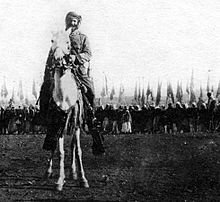Great Syrian Revolt


The Syrian Revolution (1925-1927) is by far the largest, most widespread, and most organized Syrian revolt against the French Mandate. It started in Jabal el Druze then spread to Damascus, Qalamoun, Hama, Golan Heights and south-eastern Lebanon. It was led by the prominent Druze leader Sultan Pasha al-Atrash.
Background
After the end of World War I and the defeat of the Ottoman Empire, Syria was put under the French Mandate. The Syrian government refused the mandate and declared independence. As French forces started to enter the country, they faced revolts in the mountains of Latakia (1919) and in the mountains of Harem in the northwest (1920). These revolts used ambushes and hit-and-run tactics, and were eventually quelled in 1921 after aid stopped coming from Turkey and the Syrian government.
French forces entered Damascus on July 25, 1920 after the Battle of Maysalun. King Faisal fled to Jordan and General Henri Gouraud became High Commissioner. Upon arrival, the French partitioned Syria into five states: Damascus, Aleppo, Alawite State (Latakia), Greater Lebanon, and Jabal el Druze.
